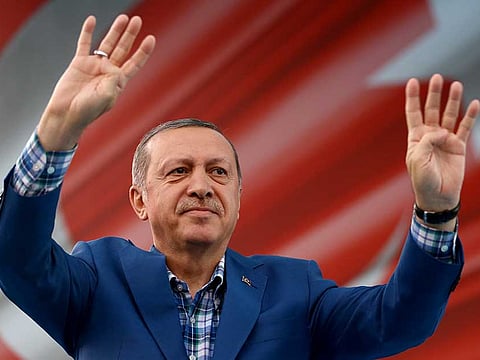Turkey’s intervention muddies Syria’s turbulent waters
Syria has evolved into a smorgasbord of competing interests and shifting alliances

Viewing the Syrian conflagration in terms of winners and losers is a fools’ game. At this juncture, there are no potential winners. There’s little left to win. Apocalyptic landscapes are hardly appropriate settings for cake and party balloons!
The millions displaced have lost homes, businesses, careers, family members and the generation that’s grown-up with death, destruction and starvation all around them will never recapture the innocence of childhood and bereft of education, their ambitions may never be realised.
Whoever dons the presidential hat down the road will require hundreds of billions, if not trillions, of dollars to rebuild infrastructure and to return eviscerated cities and towns to some semblance of their former glory. His most challenging task will be the rebuilding of a state with all its citizens united behind one flag when their struggles for freedom delivered nothing but the kind of pain few of us can even imagine or even want to.
History will surely register the futility of international interventions, which, if anything, have strewn boulders in the way of a peaceful outcome without delivering decisive blows to one side or the other/s. In retrospect, Syrians would surely be better off if other states had minded their own business because rather than a long drawn-out conflict spanning more than five years, the outcome would have been more speedily determined one way or the other.
The mighty United States succeeded in stirring the pot, holding out false hopes to the recognised political opposition and the Free Syrian Army (FSA), which were badly let down in terms of financial backing and heavy weapons. CIA and Pentagon training schemes, which allegedly included the training and arming of radicals, were dropped when it was discovered only five remained; the rest having joined-up with terrorists.
US President Barack Obama’s hesitation to go in with full force when his red line was breached left a vacuum for terrorist groups to expand their territories and served as an invitation to Moscow to go where Washington feared to tread. Russia’s cooperation with Iran and Hezbollah altered the equation in the Syrian regime’s favour.
Former US president Bill Clinton at least had the decency to regret his failure to stop the Rwandan genocide, admitting he failed to appreciate the “depth and the speed with which Rwandans were being engulfed by this unimaginable terror” whereas Obama justifies his snail-paced responses.
Worse, his administration at the behest of Turkey has now threatened to withdraw support from its own partner in the fight against Daesh (the self-proclaimed Islamic State of Iraq and the Levant), Syrian Kurdish YPG forces, unless they retreat to their bases east of the Euphrates River.
This lily-livered stance on the part of the White House amounts to a slap in the face of the only reliable ground troops that can rightly boast of their prowess against Daesh, which poses a direct threat to their families. They are heroes, menaced by Daesh, targeted by Turkey and bombed by the regime, but the courage shown by their young men and women has never faltered.
But now that Ankara has become proactive, ostensibly against Daesh — whose bestial fighters were formerly treated in Turkish hospitals ‘on humanitarian grounds’ — the Kurds are being instructed to remove themselves from the theatre of war!
The FSA was virtually dumped and now it’s the YPG’s turn to reel from Washington’s perfidy. “We understand the sensitivities of our friends in Turkey with respect to this,” said US Secretary of State John Kerry.
Yes, mustn’t get tough on Nato member Turkey that warehouses at least 50 US nukes at its Incirlik Air Base and shields the EU from being overrun by hordes of refugees and asylum-seekers! The Kurds have no such clout, so they can be kicked without repercussions.
Turkey’s unpredictable alliances have much in common with British weather. Just when it seemed Turkish President Recep Tayyip Erdogan was pivoting away from the US (which he suspects had something to do with the unsuccessful coup attempt) towards Russia and Iran, he orders a military incursion into northern Syria, aided by US military-backed rebel groups, indicating Turkish troops are there to stay for the foreseeable future.
Erdogan’s ‘dear friend’ Russian President Vladimir Putin, with whom he recently mended fences, is not amused. When asked about Moscow’s position at a joint press conference with his US counterpart Kerry, Russian Foreign Minister Sergei Lavrov stressed that all foreign parties to the conflict — with the exception of Russia and Iran, who were there at the request of the Syrian government — were infringing Syria’s sovereignty.
Syria has evolved into a smorgasbord of competing interests and shifting alliances. Kerry and Lavrov are trying to separate the good guys (or the less bad guys) from the worst guys, an uphill task because rebel groups of multiple extremist shades cooperate on the battlefield.
Where does Turkey fit and what’s its endgame? Whatever the truth, it adds another layer of complexity. There is too much firepower in Syria already. What’s in dire need are sincere mediators free of selfish agendas.
Linda S. Heard is an award-winning British political columnist and guest television commentator with a focus on the Middle East.


